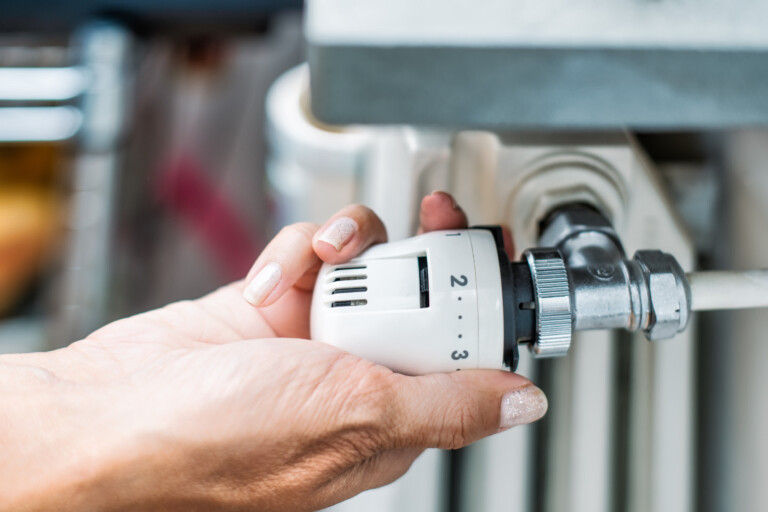
You’ve probably not given them much thought, right? Radiators aren’t exactly the poster boy for your home. They’re a very functional piece of kit, quietly working away in the background, heating your homes and drying your clothes. That is, until they start to grumble, squeak, act out and generally make a nuisance of themselves.
Radiator maintenance doesn’t always sit high on the priority list of never-ending life admin chores. Fortunately, there are a few simple and cost-effective checks you can undertake to avoid being left out in the cold this winter.
Top tips for keeping your radiators healthy
- Get your radiators and wider heating system serviced once a year. One of our friendly Gas Safe-registered engineers can help with this, so give us a call
- Bleed your radiators regularly to remove air bubbles in the system and make sure they’re working as efficiently as possible for you
- Balance your radiators. This is to make sure that all your radiators are heating up to the same degree, a simple and quick fix for a professional
- Check your boiler pressure. This is normally straightforward if you have your boiler manual to hand. If not, give us a call, we’re happy to help
Why should I regularly check my radiators?
Radiators have a long lineage, dating back as far as ancient Rome. Whilst it’s unlikely that the radiators in your home have lasted as long as that, the modern-day radiator can go on for decades if basic maintenance is carried out on a regular (normally seasonal) basis.
Performing simple checks in the summer months can:
- Ensure that you solve any issues before the mercury falls and you’re left without heating
- Mean you’re not waiting for a plumber to come and solve a more serious problem, if one is uncovered
So, whilst it’s another household chore, it’s a worthwhile one. Making sure you’re prepared for the colder months ahead can be a real cash saver for your family, right when you need it most.
What are the most common problems with radiators?
Avoiding trouble with one, or all of the radiators in your home is the main reason to service them, (and your wider heating system) regularly. However, let’s face it, even with the best will in the world, regular checks might have slipped your mind this year. So, if you find yourself in the position where one radiator has decided to have the night off and go cold on you, it’s likely down to one of these factors:
- Thermostat is set too low. This should be a simple fix for you at home
- Timer isn’t working. Have a look at your heating manual for instructions on how to reset this to get it working again
- Radiator valve is closed. Turn these anti-clockwise to open them up again
- Air pockets in the system. You can get rid of these by bleeding your radiators (more on this below).
- Blockages within the system. One of our Gas Safe-registered engineers can normally put this right in a jiffy
- Circulation fault. An engineer will be able to locate any issue with your pump and either fix or replace the unit
How to bleed a radiator
Air pockets in your radiator are a common problem, and happily, an easy one to resolve. You’ll be able to tell if trapped air is the issue if the
- radiator is cold at the top
- the entire radiator is cold
- the radiator is making a rattling sound
Before carrying out any work on the radiator, you must make sure that the entire heating system is completely turned off. Hot water inside the radiator can be dangerous, so wait for the system to cool before attempting the fix. All radiators should feel cold to touch before you begin.
- Pop a large cloth, an old towel (or something you don’t mind getting dirty) on the floor under the radiator valve. This is to protect your carpet, or other flooring from the dirty water that will spill out.
- You’ll normally find the bleed valve at the top of the radiator on one side. Insert a radiator key into the bleed valve. Open the valve by turning the key slowly anti-clockwise- making sure you’ve closed the inlet and outlet at each end. Do not fully open the valve to avoid water gushing out once the air bubbles have been removed. You should hear a hissing sound as the air begins to escape.
- As soon as the noise stops, water will start to leak out of the opening. When this happens, turn the key clockwise to close the valve.
- Before switching on your heating again, double check that the boiler pressure is correct. If the boiler pressure is too low, you’ll need to repressurise the system. Make sure you dig out your boiler manual for instructions on how to do this. If in any doubt, feel free to give us a call.
If the pressure is normal, you can switch your heating on and check that your radiators are now heating up.
Hopefully your heating system is now up and running and ready for a cosy Christmas.
Need help with your boiler or heating system? Contact us today





